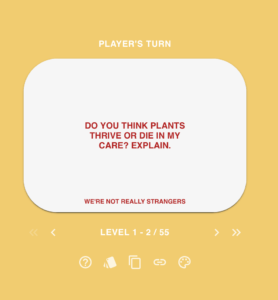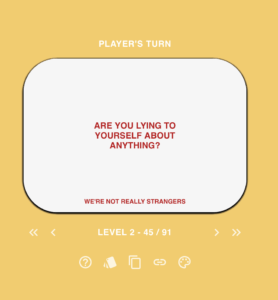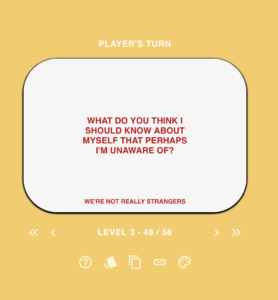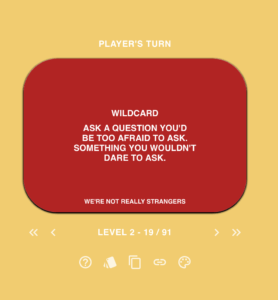Game Overview
I played We’re Not Really Strangers, a card-based game created by Koreen Odiney and released by the company We’re Not Really Strangers . This is a ‘getting to know you game’ whose purpose is to help foster meaningful connections through 3 different levels of comfort and stages of vulnerability. The recommended number of players is 2-6 and the target audience is ages 15+. This can be played by friends, families, couples, and more! It’s a very scalable and flexible game. The playtime duration is listed as 30 minutes or less, but I believe most games, and drawing from my experience playing, have lasted more than this.
Formal Elements
The game has 3 levels of vulnerability: Level 1 – Perception, Level 2: Connection, Level 3: Reflection. Players draw a card and answer. There is no competition in the game because the purpose is to come out knowing more about the people you played with on a more intimate and deeper level. The formal card deck categories include ‘Main’, ‘Expansion’, ‘One Player +’, ‘Online-Released’, and ‘Crossover’. Some sub-categories include honest rating, healing, self-reflection, race & privilege, and Bumble date.
This game is best played in a small group or even with just 2 players, so they can build up trust and honesty and better open up to one another. It is less intended to be a fun, light-hearted game, but rather a game that requires attention, vulnerability, and understanding. This makes the dynamic of the game very different!



Types of Fun & Vulnerability
The types of fun introduced are discovery, fellowship, and possibly sensation and challenge. Players are encouraged to venture and explore more about their connections with the people they are playing with and form a tighter bond. This game is meant to be a ‘get to know you’ and warns that it can invoke strong emotions and feelings during gameplay. This is not meant to be a submission game where you play to pass time. The visceral appeal towards getting to know more about other players can be very emotional! I believe this could be a challenge type of fun as well because many people put up a lot of boundaries and walls to protect their feelings but I think this game challenges the players themselves to develop trust in other players and really become more in tune with their feelings.
The wild card elements of the game makes it super intriguing to play! Some wild cards lets players create their own questions to ask. Players are encouraged to ask the difficult questions, even questions they’ve been secretly thinking about under the veil of playing a game, creating a non-judgmental space for sharing.

Additionally, the long list of sub-categories are crossovers are very cool elements as well, because it allows for selective questions based on the comfort level of the players and their relationships with one another (friends, more than friends, in a relationship, family bonding, etc).
Comparison
This game is similar to the card game Let’s Get Deep, a game created by the same creators of WHAT DO YOU MEME?. It also has three levels of conversation topics, though with slightly different categories. For Let’s Get Deep, the categories are: Level 1 – Ice Breakers, Level 2 – Deep Cards, and Level 3 – Deeper Cards. The number of players and age range are the same as well, though this game is intended more so for those in relationships but can be applicable to friends on a night in. So, I don’t believe either game is better than the other but I do think there are some suggestions that can be drawn from the each game to improve. For example, the ice breakers cards can be helpful for acquaintances who are starting to get to know each other.
Strengths & Improvements
This game works because there aren’t really rules. Players just answer questions that they want to answer and there’s no rule that says every player must answer all questions asked. Some questions might be uncomfortable to answer or too deep. Some players might not be ready to form that deep bond with the people they are playing with but appreciate having a better connection. This game does not quite consider the different stages of friendships or relationships of people, and I think some questions are a bit too extreme at times. From my experience, I tend to recall a house rule being if a card is too “intense” or “crazy”, you can skip it and draw a new card. One improvement could be integrating a get to know you ice-breaker category, inspired by the Let’s Get Deep card game. Additionally, I think it would be fun to integrate a family-friendly deck of cards that won’t embarrass families too-intensely at a get-together. The game pushes for a lot of vulnerability, but I think throwing in some fun cards can help lighten the mood sometimes as well!



